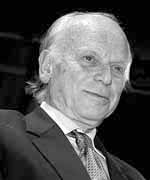◀ ▲ ▶History / 20th-century / Person: Wschebor-Wonsever, Mario Israel
Person: Wschebor-Wonsever, Mario Israel

Mario Wschebor-Wonsever was a Uruguayan mathematician and statistician who has a remarkable record of outstanding papers,
and an international reputation of speaking at conferences around the world.
He authored 3 books and published significant algebraic and geometrical papers.
His career lasted over 40 years, earning awards and representing Brazil at the International Congress of Mathematicians.
Yet his career was disrupted by having to flee because of political events. He was also passionate about political and social issues and fought throughout his career for an improved university system.
Mathematical Profile (Excerpt):
- Mario Wschebor was brought up and educated in Montevideo, where he attended high school.
- Wschebor, as a student representative played a major role in drafting the teaching aspects of the 1958 Organic Law.
- Another achievement of Wschebor's as student representative was achieving Rafael Laguardia's reappointment.
- Mario Wschebor, shortly after entering the Faculty, along with Luis Osin, several years older than him, were student representatives on one of those councils made up of a professional majority.
- The fiery defence of Luis and Mario, together with the teaching minority, finally achieved victory after a long process and that is probably one of the milestones in Mario's career as a representative of Students of the Faculty.
- On the mathematical side, Wschebor became an active participant in the Seminar on Probability at the Institute of Mathematics and Statistics.
- Wschebor began teaching Financial and Actuarial Mathematics in 1962, a year before he graduated with his Engineering Degree.
- Wschebor's first publication was a joint paper On the Statistical Properties of the Walsh Functions (1965) with Révész.
- Wschebor was awarded a Postgraduate Diploma in Probability Theory, Mathematical Statistics and its Applications, in 1964.
- Wschebor's essay, despite its brevity, manages to accurately place the imperialist cultural tactic of the United States in its general environment.
- Mario was a militant, half his life was militant, and he studied, and after going away and coming back, we decided to leave ...
- Mario entered a competition at the Centre for Mathematics in the Engineering Faculty when the opportunity arose to have a scholarship in France.
- Mario had the opportunity to present himself and he won.
- Mario's scholarship was small, so we lived very frugally.
- Wschebor was awarded a doctorate in 1972 for his thesis Recouvrements Aléatoires du Cercle Ⓣ(Random circle covers).
- They started looking for Mario, they went to look for him in an apartment that we had sold ...
- Mario was imprisoned, but only for 24 hours.
- Mario was left without a job, the Institute of Mathematics closed.
- We note here that Margarita Maria Wschebor studied medicine and became a professor in the Psychiatric Clinic of the Faculty of Medicine, Universidad de la República, Montevideo.
- Wschebor and several others who had fled from the Institute of Mathematics and Statistics in Montevideo in 1973, including Gonzalo Pérez Iribarren, got positions in the Faculty of Engineering of the National University of Luján in Buenos Aires and began work there in February 1974.
- Wschebor began teaching mathematics to large first year classes and advised the local staff, who had been rather poorly trained, in how to improve their teaching skills.
- It proved to be a short appointment, however, since in September 1974 the university authorities decided to only employ Argentine staff and Wschebor, together with the other Uruguayan mathematicians, were all fired.
- Shortly after arriving, however, Wschebor was offered a position in the Department of Mathematics and Computer Science of the Simón Bolívar University of Caracas, Venezuela.
- In Venezuela, in addition to working at the Simón Bolívar University of Caracas, Wschebor also worked at the School of Mathematics and Physics in the Faculty of Sciences of the Central University of Venezuela.
- Wschebor organised a Probability and Statistics Seminar as a joint project of these two institutions and also with the Venezuelan Institute of Scientific Research.
- Through the difficult years following 1973, Wschebor continued to publish papers, one in 1975, one in 1977 and one in 1979.
- Wschebor continued to have close ties with his French colleagues and with institutions in that country and made many visits in the late 1980s and the 1990s.
- Wschebor did not return immediately but continued to work in Venezuela until 1987.
- When Mario taught a course he did not teach Mathematics: he lived it and recreated it, his story took you to the very sources of the various concepts and made you feel part of that gigantic collective construction.
- Rice's method of Azaïs and Wschebor for the study of the distribution of the maximum of a random process is presented in the book "Level sets and extreme of random processes and fields", in collaboration with Azaïs, edited in 2009 by Wiley.
- Wschebor was around 70 years old when he became ill and died at age 71.
Born 3 December 1939, Montevideo, Uruguay. Died 16 September 2011, Montevideo, Uruguay.
View full biography at [MacTutor](https://mathshistory.st-andrews.ac.uk/Biographies/Wschebor/
Thank you to the contributors under CC BY-SA 4.0! 

- Github:
-

- non-Github:
- @J-J-O'Connor
- @E-F-Robertson
References
Adapted from other CC BY-SA 4.0 Sources:
- O’Connor, John J; Robertson, Edmund F: MacTutor History of Mathematics Archive
